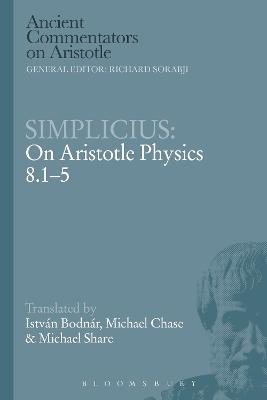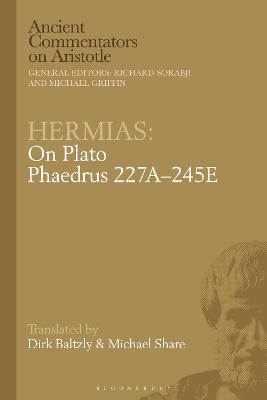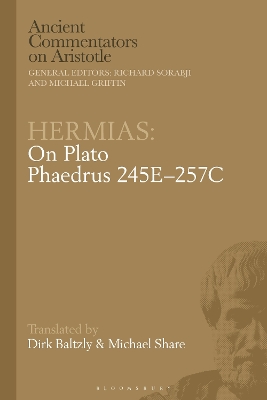Ancient Commentators on Aristotle
4 total works
Simplicius: On Aristotle Physics 8.1-5
by Istvan Bodnar, Michael Chase, and Michael Share
Published 20 December 2012
In this commentary on Aristotle Physics book eight, chapters one to five, the sixth-century philosopher Simplicius quotes and explains important fragments of the Presocratic philosophers, provides the fragments of his Christian opponent Philoponus' Against Aristotle On the Eternity of the World, and makes extensive use of the lost commentary of Aristotle's leading defender, Alexander of Aphrodisias.
This volume contains an English translation of Simplicius' important commentary, as well as a detailed introduction, explanatory notes and a bibliography.
This volume contains an English translation of Simplicius' important commentary, as well as a detailed introduction, explanatory notes and a bibliography.
This commentary records, through notes taken by Hermias, Syrianus' seminar on Plato's Phaedrus, one of the world's most influential celebrations of erotic beauty and love. It is the only Neoplatonic commentary on Plato's Phaedrus to have survived in its entirety. Further interest comes from the recorded interventions by Syrianus' pupils - including those by Proclus, his eventual successor as head of the Athenian school, who went on to teach Hermias' father, Ammonius.
The first of two volumes of Hermias' commentary, the chapters translated here discuss the argument that the soul can be proved immortal as being the self-moving source of eternal motion. Aristotle explicitly disagreed with Plato on this treatment of the soul and Syrianus, having previously (in a commentary on the Metaphysics) criticised Aristotle severely when he disagreed with Plato, feels obliged here, too, to address the apparent disagreement. This new translation is thus vital for understanding Syrianus' attitude to Aristotle.
The first of two volumes of Hermias' commentary, the chapters translated here discuss the argument that the soul can be proved immortal as being the self-moving source of eternal motion. Aristotle explicitly disagreed with Plato on this treatment of the soul and Syrianus, having previously (in a commentary on the Metaphysics) criticised Aristotle severely when he disagreed with Plato, feels obliged here, too, to address the apparent disagreement. This new translation is thus vital for understanding Syrianus' attitude to Aristotle.
This volume completes, starting from chapter 6, the commentary by the young Philoponus on Aristotle's Categories, of which chapters 1-5 were previously published in this series (Philoponus: On Aristotle Categories 1-5 with Philoponus: A Treatise Concerning the Whole and the Parts). This ancient commentary was the first work in the Aristotelian syllabus after a general introduction to Aristotle by the same author. It is influenced by an extant short anonymous record of Philoponus' teacher Ammonius' lectures on the same work, but Philoponus' commentary is two and a half times as long as that anonymous record, and includes special contributions of Philoponus' own, for example in philology, Christian theology and in disagreements with Aristotle.
This English translation of Philoponus' work is the latest volume in the Ancient Commentators on Aristotle series and makes this philosophical work accessible to a modern readership. The translation is accompanied by an introduction, comprehensive commentary notes, bibliography, glossary of translated terms and a subject index.
This English translation of Philoponus' work is the latest volume in the Ancient Commentators on Aristotle series and makes this philosophical work accessible to a modern readership. The translation is accompanied by an introduction, comprehensive commentary notes, bibliography, glossary of translated terms and a subject index.



